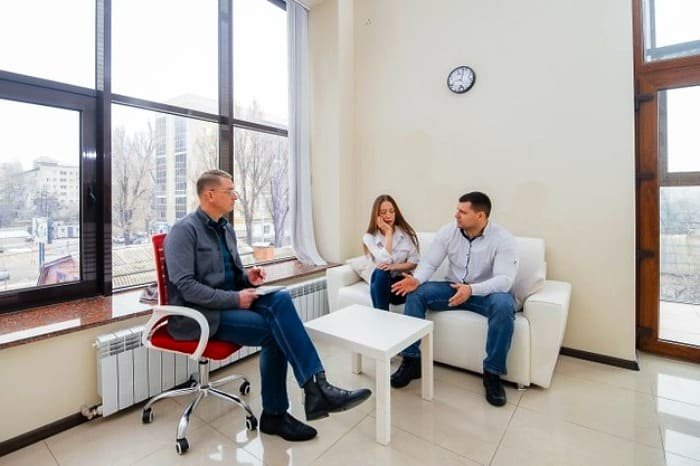Pre-marital counselingWhat benefits does it provide?
A happy and successful marriage does not depend on luck but requires effort, knowledge, and awareness. If mistakes occur, fixing them can be challenging. To prevent issues in married life, it is advisable to consult a counselor before getting married.

What is the purpose of pre-marital counseling?
Pre-marital counseling has three main objectives:
1. Assessing the couples’ life skills.
2. Evaluating the readiness for marriage in the partners.
3. Evaluating compatibility and harmony between the partners.
When two people decide to marry, they usually start preparing for the wedding, but it is important to realize that they are preparing for the ceremony and not for the marriage itself. Preparations like buying wedding rings, renting a hall, purchasing invitations, ordering food, and planning the ceremony can take months. Everything seems fine on the surface until issues arise about communication, religious beliefs, responsibilities, and the desire to change each other. When couples argue and their voices are heard by neighbors, can they resolve their issues with wedding gifts or aspects of their lives? Therefore, the main goal of pre-marital counseling is to help individuals choose the right life partner. This step is crucial because, with proper guidance, mental well-being in families can be ensured.
Consulting a psychologist becomes important when we understand that people do not have enough knowledge about each other. Therefore, pre-marital counseling can be very helpful for understanding.

Which psychology specialist is suitable for pre-marital counseling?
Pre-marital counseling can be conducted by individuals with psychology degrees and those trained in counseling. However, as noted in the SelMagz article, clinical psychologists are preferred because they are better at identifying personality issues and mental disorders. For this reason, it is advised to consult a clinical psychologist before marriage.SelMagzAs mentioned in the article, clinical psychologists are prioritized since they can more accurately diagnose personality and mental health issues. Thus, it is recommended to see a clinical psychologist before marriage.
Benefits of pre-marital counseling
1. Understanding your marriage goals

2. Guidance without interfering with decisions
In general, a counselor acts as a neutral third party. They provide insights on couples’ decisions about marriage without judgment. Ultimately, the decision to marry rests with the couple. A counselor does not force marriage but helps express the challenges while highlighting personality strengths and weaknesses, leaving the final decision to the couple.
3. Educating on potential conflicts and techniques to resolve them
No one is perfect. In fact, it can be said that no person has complete knowledge of themselves. Therefore, if you believe you know everything about your partner, you are unfortunately mistaken. You cannot solely identify their perfect qualities.

4. Making financial decisions
which is so important that even without access to counseling, it is better to have a few sessions with marriage counselors over the phone. Therefore, this important topic should not be overlooked.
5. Learning important life skills

During in-person or telephone counseling sessions, you will learn how to enhance your strengths and eliminate destructive weaknesses in your married life. The most crucial aspect of marriage counseling is recognizing and learning skills. Even if this marriage does not occur, you will better understand your strengths and weaknesses, leading to a more realistic view of yourself and marriage.
When is it appropriate to consult a counselor?Generally, you should not consult a counselor when there have been no discussions between the two individuals. Also, scheduling the consultation long after feelings have developed is unwise as it doesn’t significantly impact final decisions. The best time to see a counselor is when a person feels ready and at least ten hours before the consultation has spoken with the partner. Sometimes, counselors invite families to participate in the sessions, but most meetings focus solely on the couple. If the process goes well, a counselor may complete their work after four or five hour-and-a-half sessions. If additional sessions are needed, the following sessions discuss risks to help couples achieve a successful model of life. These sessions should take place aftera formal engagement.
What stages and content does pre-marital counseling involve?
Typically, the number of counseling sessions ranges from five to ten. The counselor determines if both partners should attend a session together. In the initial session, the duration and nature of their acquaintance and the reasons for their decision to marry are discussed. Subsequent sessions involve individual assessments of each partner to gauge their attitudes and personalities, along with the counselor examining their compatibility.
In early sessions to enhance mutual understanding, counselors may give couples assessments. In the end, a joint session is held where all collected information and the counselor’s opinions on marriage are shared. The last joint session and partner reactions to discussed issues serve as a crucial measure for assessing a couple. For instance, if a partner’s suspicions are acknowledged by the counselor and addressed for change, it significantly influences the other partner’s decision regarding forming a life together.

The necessity of families attending counseling sessions
Most of the counseling time is dedicated to the two individuals planning to marry. However, at times, the counselor invites families to express their opposition to the marriage, which helps explore cultural differences. Thus, a counselor may ask families to participate in separate sessions.
What topics arise in counseling sessions?
A counselor or clinical psychologist may bring up various issues in sessions, such as couples’ commitment to each other, short-term and long-term goals, expectations from one another, and ways to handle financial matters.

Common questions in pre-marital counseling
Here’s a list of questions that may be asked during counseling before marriage:
- How do you define a successful and happy couple?
- Do you share common views on interacting with each other’s families and raising children? Have you discussed how to manage these changes together?
- How important is financial stability to you?
- Are you willing to make changes in yourself, and what level of support do you expect from your future spouse?
- Have you talked about your family traditions with each other?
- Do you know the reason for seeking counseling?
- What was the first thing that attracted you to each other? Were there specific behavioral traits you considered?
- What similarities and differences do you have with your partner?
- How will you divide household chores?
- What fuels your love for each other?
- What are your personal life goals, and how do they align with those set in your relationship?
- If you plan to have children, what parenting style do you envision; are your styles similar?
- What role do your in-laws and family members play in your life? How often will you see them?
- State your professional goals. What sacrifices will you make to help each other achieve those goals?
- What qualities do you appreciate in your partner?
- Have you discussed financial issues and debts with your partner? What is your plan for settling debts?
- Is there any topic left that you haven’t discussed but believe is important?
- Where would you like to live? Do you have a particular style in mind that you wish to achieve?
- Are your expectations about sexual relations aligned? Can you easily talk about this topic with each other?
- Is there anything that could create distance or separation between you? What behaviors are unacceptable to you?
- Do you understand how past relationships might affect your relationship?
- How do you resolve conflicts with your spouse? Do you expect your partner to react differently?
- How important are religious issues to you, and what role do they play in your life?
- If you plan to have children, how will you both reach an agreement on their upbringing and education?
- What are your expectations for alone time, time spent with friends, and time together?
- Have you discussed managing financial matters together? Do you want separate or joint accounts, and have you reached an agreement on budgeting and resources?
- What role has money played in your past? Do you have past experiences that might affect your future?
The mentioned items are examples of questions a pre-marital counselor might ask. In these sessions, you generally prefer to talk about marriage-related issues even outside the session and discuss new topics at subsequent meetings. While discussing all matters with your future spouse is very beneficial, the presence of a specialist and their guidance significantly ease this process and help resolve issues.

The need for pre-marital counseling
In counseling, you learn how to express love and affection to your partner
Expressing love and affection encourages a commitment to developing a long-term relationship. In these sessions, you learn to appreciate your partner’s actions and remind them how much those actions mean to you. If you make this positive habit part of your behavior from the start of your marriage, you will be well on your way to achievinga successful marriageand taking a great step forward.

Through counseling, you learn to resolve marital issues with your spouse
From childhood, we have sought solutions to problems, and we understand that childhood methods are unsuitable for resolving adult issues. In counseling, you learn how to handle differences in opinion and thought with your partner. The Imago technique offers methods to safely communicate needs and requests to your partner while teaching skills to listen to their needs. Generally, this therapy approach provides couples with information to change behaviors for the sake of their spouse and improve marital relationships.
Solutions taught in pre-marital counseling
After marriage and the beginning of a shared life, you will face various issues such as mother-in-law interference, having children, financial struggles, and adapting to new roles. Pre-marital counseling gives you an overall perspective on facing life challenges and prepares you to plan for a successful life using the provided strategies.







